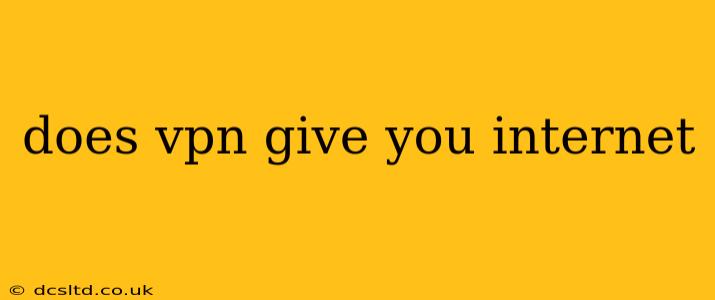The short answer is: no, a VPN doesn't give you internet access on its own. A VPN, or Virtual Private Network, is a tool that enhances your existing internet connection, not a source of internet access itself. Think of it like this: you need a car to drive, and a VPN is like adding a GPS and enhanced security system – it improves your journey, but doesn't provide the car (internet connection) in the first place.
To understand this better, let's break down what a VPN does and what you need to use one.
What is a VPN and What Does it Do?
A VPN creates a secure, encrypted connection between your device (computer, phone, etc.) and the internet. It essentially creates a "tunnel" that masks your IP address and encrypts your data, making it harder for others to track your online activity or intercept your information. This is particularly useful for:
- Protecting your privacy: Masking your IP address prevents websites and trackers from knowing your exact location and online habits.
- Securing public Wi-Fi: Public Wi-Fi networks are often vulnerable to hacking. A VPN adds an extra layer of security to protect your data when using these networks.
- Bypassing geo-restrictions: Some websites and streaming services block content based on your location. A VPN can mask your IP address, making it appear as though you're in a different location, allowing you to access geo-restricted content.
How Does a VPN Work with Your Internet Connection?
A VPN requires an existing internet connection to function. You need an active internet service from your internet service provider (ISP) – like Comcast, Verizon, or another provider – before you can use a VPN. The VPN then sits on top of that connection, modifying and securing your data as it travels to and from the internet.
Think of it like this: your ISP provides the road, and the VPN is a secure vehicle that travels on that road. Without the road (internet service), you can't use the vehicle (VPN).
Frequently Asked Questions about VPNs and Internet Access
Here are some common questions people have about VPNs and their connection to the internet:
Does a VPN improve internet speed?
No, a VPN generally doesn't improve internet speed. In fact, it often slightly reduces speed due to the encryption and routing of data through the VPN server. However, the reduction is usually minimal and negligible for most users. The impact on speed depends on the VPN provider, server location, and your internet connection's speed.
Can I use a VPN without an internet service provider?
No. A VPN requires an active internet connection provided by an ISP. The VPN simply secures and modifies that connection; it doesn't create the connection itself.
Does a VPN provide anonymous internet access?
While a VPN enhances your privacy by masking your IP address and encrypting your data, it doesn't provide complete anonymity. Your VPN provider still has some level of visibility into your online activity (though reputable VPNs have strong privacy policies to protect your information). True anonymity online is incredibly difficult to achieve.
What if my internet goes down while using a VPN?
If your internet connection goes down, your VPN will also stop working. The VPN relies entirely on your existing internet service. It cannot create an internet connection on its own.
In conclusion, a VPN is a valuable tool for enhancing online security and privacy, but it's crucial to remember that it doesn't replace your need for an internet service provider. You need an active internet connection from your ISP before you can use a VPN.
